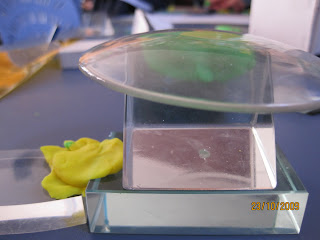A sound theoretical baseFor those of you who have been to our workshops or are going to the Manawatu Reading Association meeting on Thursday, these are the references for the Discovery Time 'Key Ideas': - Play, student directed learnng, 'hands-on' activity based, creativity and whole child.Play
Ministry of Education. (1996). Te Whariki: He Whariki Matauranga mo nga Mokopuna o Aotearoa (Early Childhood Curriculum). Wellington: Learning Media.
Sutton-Smith, Brian. Cited in Hammond. Leading and Learning for the 21st C
sadly “the typical image of play is a single child sitting in front of a television set or video game.’ This is not play – play is an open ended experience initiated by children that involves pretence and spontaneous creative activity. It’s a time of wonder and sensory exploration.”
Dominion Post 19.04.08
The Importance of being Playful
“You can have your ballet lessons, extra tuition, sport and music lessons, but children must have creative personal play as well.”
“Kids learn socializing skills, creative skills and judgement skills and about right and wrong when they’re allowed to play.”
'Hands on' activity based learning
Marcon, R.A. (2002). Moving up the grades: Relationship between preschool model and later school success. Early Childhood Research & Practice, Vol 4(1),
Available:
Those who had hands on experiences in early schooling did better later on
Michael Shayer – Children are less able than they used to be
11 and 12 year old students in year 7 are “now on average between 2 & 3 years behind where they were 15 years ago” in terms of cognitive and conceptual development.
They know less about the world and how things work
Reason – speculation
“Lack of experiential play in primary schools, and the growth or a video game, tv culture. Both take away the kinds of hands-on play that allows kids to experience how the world works in practice and to make informed judgements about abstract concepts”
Importance of student directed learning
Dockett, Sue. Cited in NSW Dept. of Education and Training. Hurry! Hurried! Hurrumph! Reprinted in Education Horizons. Vol 8. No 5, 2005 pp. 30-31.
“Parents see adult supervised activities as a way of doing something valuable. Play isn’t seen as valuable any more in its own right”
“The most creative people in the world play with ideas.”
“Hurried children don’t get a chance to test ideas, explore and experiment because they are always meeting adult time frames and expectations”
The importance of creativity
Yong Zhao (2006) “Are We Fixing the Wrong Things?” Educational Leadership. vol 63 no 8, pp. 28-31
“Creativity cannot be taught but it can be killed”
The current focus on centralized curriculum, standardized testing, accountability,required course of study – could kill creativity, the United States real competitive edge.
Educating the 'whole child' - social / emotional, physical and cognitive.
“Modern life leads to more depression among children”
“Children need what developing human beings have always needed, real food (as opposed to processed “junk”), real play (as opposed to sedentary, screen-based entertainment), first-hand experience of the world they live in and regular interaction with the real-life significant adults in their lives...
They also need time. In a fast-moving hyper-competitive culture, today’s children are expected to cope with an ever-earlier start to formal schoolwork and an overly academic test-driven primary curriculum. They are pushed by market forces to act and dress like mini adults and exposed via the electronic media to material which would have been considered unsuitable for children even in the very recent past. Our society rightly takes great pains to protect our children from physical harm, but seems to have lost sight of their emotional and social needs.”












































